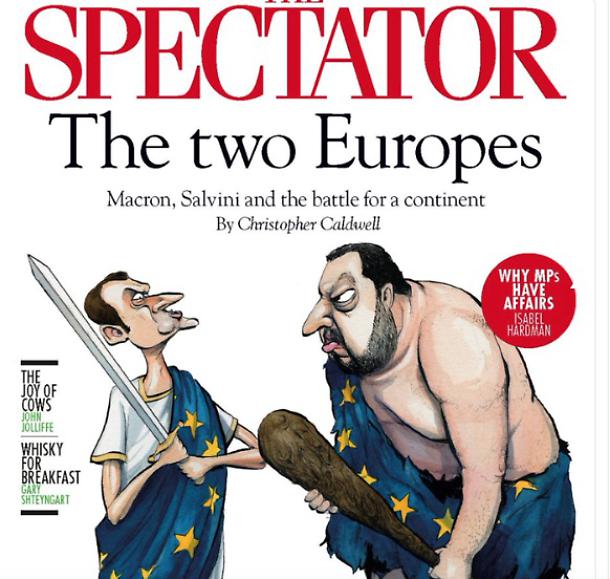Eurobudget francogermanico. L’Italia guida l’opposizione.
Giuseppe Sandro Mela.
2018-11-23.

Anticipiamo le conclusioni: Mr Salvini è un grande.
*
«Euro area finance ministers gave a cool reception to the Franco-German proposal to create a eurozone budget at their meeting in Brussels on Monday (19 November).»
*
«It would remain part of the broader reformed EU budget and would not create a separate structure, leaving its fate as part of the gruelling negotiations between member states over the EU’s long-term finance plan for 2021 to 2027.»
*
«The proposal did not include a stabilisation tool, to help struggling economies in times of downturn, as was earlier championed by France’s president Emmanuel Macron.»
*
«But some of the fiscally conservative northern countries questioned what was the added value of such an instrument, given that the bloc already had EU structural funds, innovation funds, the so-called ‘Juncker plan’, and the European Investment Bank (EIB), all of which tended in the same direction»
*
«Many questions remain»
*
«We need to be really convinced that something is in the interest of the Netherlands, in the interest of Dutch citizens, in the interest of the Dutch taxpayer, and if it’s not, then we’re out»
*
«The French and German finance ministers said that the eurozone budget should be in place in by 2021.»
*
«France’s Bruno Le Maire and Germany’s Olaf Scholz both said that a compromise could still be reached with their colleagues»
*
«But opposition also came from the south, with Italy’s interior minister Matteo Salvini saying in Rome that if the Franco-German proposal damaged Italy, then he would oppose it»
*
«His populist government aims to break EU fiscal rules in order to splurge on welfare, raising the risk that the commission would, later this week, propose to put Rome under a disciplinary procedure»
*
«And with the Italian problem uppermost in finance ministers’ minds, appetite for eurozone reform is running low.»
* * * * * * *
Questo articolo sarebbe da mettersi in un quadretto.
Inizia dicendo che
«Euro area finance ministers gave a cool reception to the Franco-German proposal to create a eurozone budget»
Una persona normale capirebbe che i ministri delle finanze della zona euro abbiano accolto favorevolmente la proposta franco-tedesca di creare un bilancio della zona euro.
Poi, si snoda mestamente ricordando come i paesi nordici ed i Paesi bassi si siano dissociati.
A seguito ricorda mestamente come il tutto potrebbe essere concretizzato solo nel 2021, ossia due anni dopo delle elezioni europee che cambieranno l’europarlamento.
Infine prende atto che Mr Salvini non ne vuole sapere, ma proprio per nulla.
Infine conclude dicendo che:
«with the Italian problem uppermost in finance ministers’ minds, appetite for eurozone reform is running low.»
* * * * * * *
Ok.
Adesso dovrebbe essere ben chiaro come la posizione italiana condizioni quella della Unione Europea.
Sono passati i tempi nei quali l’Italia aveva governanti venduti ai gerarchi di Bruxelles, succubi lacchè di Francia e Germania, vogliosi solo che dal tavolo cadesse qualche briciolotto per le loro casse personali.
Infine, si noti bene, ma molto bene.
Non si nomina il Ministro Tria, né il Premier Conte, né Mr Di Maio. Si nomina invece Mr Salvini, che neppure era presente, ma aveva commentato da Roma.
Euro area finance ministers gave a cool reception to the Franco-German proposal to create a eurozone budget at their meeting in Brussels on Monday (19 November).
The new budget was meant to support investment and boost convergence in the region.
It would remain part of the broader reformed EU budget and would not create a separate structure, leaving its fate as part of the gruelling negotiations between member states over the EU’s long-term finance plan for 2021 to 2027.
The proposal did not include a stabilisation tool, to help struggling economies in times of downturn, as was earlier championed by France’s president Emmanuel Macron.
That idea fell by the wayside in talks between France and Germany in June, which produced the “Meseberg Declaration”, setting out how to strengthen the European project.
On his way into Monday’s meeting, eurogroup president Mario Centeno sounded optimistic on the idea, saying it could come as an early “breakthrough” before EU leaders decided, in December, on a broader package to defend the common currency.
But some of the fiscally conservative northern countries questioned what was the added value of such an instrument, given that the bloc already had EU structural funds, innovation funds, the so-called ‘Juncker plan’, and the European Investment Bank (EIB), all of which tended in the same direction.
“Many questions remain,” Dutch finance minister Wopke Hoekstra said.
“We need to be really convinced that something is in the interest of the Netherlands, in the interest of Dutch citizens, in the interest of the Dutch taxpayer, and if it’s not, then we’re out,” he said.
The French and German finance ministers said that the eurozone budget should be in place in by 2021.
France’s Bruno Le Maire and Germany’s Olaf Scholz both said that a compromise could still be reached with their colleagues.
“No one said it [a eurozone budget] will never happen,” Scholz said, adding that after Brexit 85 percent of the EU’s GDP will be denominated in euros.
But opposition also came from the south, with Italy’s interior minister Matteo Salvini saying in Rome that if the Franco-German proposal damaged Italy, then he would oppose it.
He spoke amid Italy’s battle with the EU commission over its national budget plans for 2019.
His populist government aims to break EU fiscal rules in order to splurge on welfare, raising the risk that the commission would, later this week, propose to put Rome under a disciplinary procedure.
And with the Italian problem uppermost in finance ministers’ minds, appetite for eurozone reform is running low.

Nessun commento:
Posta un commento